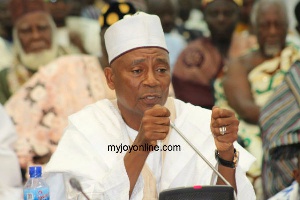 Minister for Inner City and Zongo Development, Alhaji Boniface Abubakar Saddique
Minister for Inner City and Zongo Development, Alhaji Boniface Abubakar Saddique
The Minister for Inner City and Zongo Development, Alhaji Boniface Abubakar Saddique, has rejected the recent call by the Minister for Environment, Science, Technology and Innovation for Muslims to be summoned to worship through WhatsApp and text messages, saying it is his own manifesto.
Professor Kwabena Frimpong-Boateng had called on Muslim leaders in the country early in April, this year, to ditch the traditional megaphones and rather consider using mobile phone applications for the Islamic call to worship (the Azan or Adhan) to reduce noise pollution. His proposal drew rapid rage, with intense calls from Muslim groups nationwide for the megaphones to stay on the vertical poles and the minister rather be ditched at once from cabinet.
Alhaji Saddique told journalists Wednesday in the Upper East region his colleague minister spoke for himself and not the government, adding “people should not politicise” what the professor said.
“The NPP Government has in nowhere mentioned or instructed that calling the Azan should be stopped or we should WhatsApp. This is a personal thought of a colleague minister who, in his submission, was talking about noise pollution. And I want to say it emphatically here that nowhere has President Nana Akufo-Addo or his Vice President, Mahamudu Bawumia, instructed that Azan is done by Whatsapp or text messages.
“I am the messenger of the Zongo people. If there is any message to be carried to the Zongo people, it would be passed through me. And there is nowhere we have sat on that— and Frimpong-Boateng, in his own wisdom, never said that Azan should be cancelled. People should not politicise it,” said Alhaji Saddique who, when asked by Starr News if he would welcome the proposal, added resolutely: “Not at all. No.”
Four Zongo Communities get Artificial Turf Football Parks
Alhaji Saddique was in the region to assess the needs of Zongo communities across the 15 municipalities and districts.
He began the tour with an inspection visit to a facility generally referred to as “The Mobil Football Park” in the regional capital, Bolgatanga, which is being upgraded to an artificial turf football amphitheatre. The astroturf pitch in Bolgatanga, according to the ministry’s Director of Communications, Sebik Bugri, is among four of such facilities government has rolled out for construction— the others being at Madina in the Greater Accra region, Kyebi in the Eastern region and Walewale in the Northern region.
The minister also held meetings with traditional chiefs of the various ethnic groupings in the zongo communities toured Wednesday as well as members of the Navrongo Traditional Council (NTC). Exclusion of zongo youths from government-initiated job opportunities was among a number of concerns raised in the meeting the minister had with zongo opinion leaders in the regional capital.
“You know zongos are areas where poverty is at its peak, illiteracy very high, diseases, unemployment unimaginable. It’s one of the reasons the President established the ministry to ensure that [zongos don’t] become areas of despair, areas of social conflict, areas of difficulty.
“It’s so important that we come, acquaint ourselves and identify the problems within these areas. They are areas in deficit of infrastructure— roads, drains, clinics, schools and many other more,” observed the minister.
We need to change public perception about Zongos— Minister
After an encounter with drains and empty plots clogged with waste in some parts of the Zongos toured, a worried-looking Alhaji Saddique underscored the need for all hands to get busy in the last week of every month— a time he has set aside for a general cleanup exercise in all Muslim communities in the country.
“It is so important that we try to change the perception of the people’s mind about Zongo. Zongos have become sanctuaries for criminals. Most of our youths are so traumatised because of unemployment and, so, most of them have taken to drugs. We need to do something about it— rehabilitation and also helping to get jobs for them to change their living standards,” stated the minister.
He also pointed out: “We have four thematic areas we are considering— infrastructure and sanitation enhancement, social development and economic empowerment, crime and security control as well as heritage preservation and cultural promotion. All these things are things that I believe, that if we have control over them, Zongos will change to be a better place to live.”